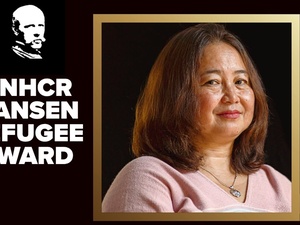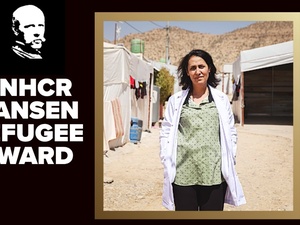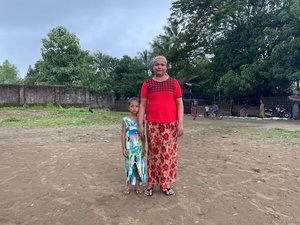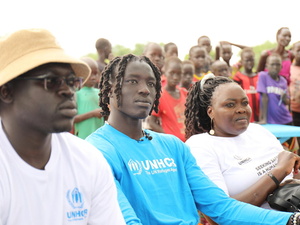UNHCR helps north-west Sri Lankan villages recover from brutal murders
UNHCR helps north-west Sri Lankan villages recover from brutal murders

A boy flies his kite beside boats in the Mannar region of north-west Sri Lanka. UN agencies are helping local fishing cooperatives expand their markets as part of a wider effort to make people feel safer.
COLOMBO, Sri Lanka, January 15 (UNHCR) - Suganthapuri was virtually deserted overnight after a family of four, including two children, were hacked to death last June in the village located in north-west Sri Lanka's Mannar region.
The June 9 mass murder shocked the nation - the motive is still unclear and nobody has been brought to justice. But villagers are slowly recovering with the help of UNHCR, which is spearheading the implementation of projects aimed at making people in Suganthapuri and two neighbouring villages feel safer.
"When we first came to Suganthapuri after the incident, there was nobody here. Not a person, a cow or even a cat," said a UNHCR field officer. "But in the last one-and-a-half months, after meeting with the community to discuss how the United Nations and our partners can work together with them and the law enforcement agencies to increase confidence and feelings of security, people are now starting to think about returning and how they can rebuild their lives."
UNHCR began by asking people to clear away heavy foliage. Wildly growing trees and thorny bushes made it difficult for residents to see more than a few metres from their front door. The agency and the Sri Lanka Red Cross used mechanical diggers to clear the main public areas in the village.
"The jungle clearance is a good first step, and will make many people from this area think more seriously about returning to their homes," said Thamara*, who returned to Suganthapuri with her family a few weeks ago after five months spent sheltering with a friend in a nearby village.
"The opening up of these public areas and the installation [by Save the Children] of [solar] street lighting allows those who have returned to stay out later at night," she added. Kerosene lamps also help children find their way home in the dark after finishing classes.
The International Organization for Migration, meanwhile, is looking at the possibility of upgrading village roads and repairing fences.
UNHCR and its partners are also trying to ensure that people can continue to earn a living in the area, where the important fisheries sector has been hit by recent fighting between government forces and the rebel Liberation Tigers of Tamil Eelam (LTTE). Restrictions have been placed on fishing hours.
The UN Development Programme (UNDP) and the local fishing cooperative are working out ways for lorries to pick up the daily catch so it can be transported to the major markets in southern Sri Lanka. UNDP is also helping to improve road access.
"Selling fish in the south will help us earn a better income for our families. We'll be able to get a higher price for our catch," said a community leader in the neighbouring village of Bastipuri.
The positive response of the community towards the confidence-building measures has encouraged UNHCR and other agencies to look for new ways to add value to the lives of the displaced community and to expand the programme to other areas.
UNHCR is jointly leading the implementation of similar measures in the north and east of Sri Lanka. Activities include legal assistance, restoration of services and protection monitoring. Meanwhile, the refugee agency continues to advocate for the voluntary and sustainable return or relocation of displaced persons, based upon the individual's informed decision.
Although peace of mind will depend upon a lasting peace in Sri Lanka, life is looking a little brighter for the people of Suganthapuri and neighbouring villages. "I'm very hopeful for the future," said Thamara. "It's most important to me that I can feel safe and independent to live my life in freedom."
* Name changed for protection reasons.
By Lyndon Jeffels in Colombo, Sri Lanka









